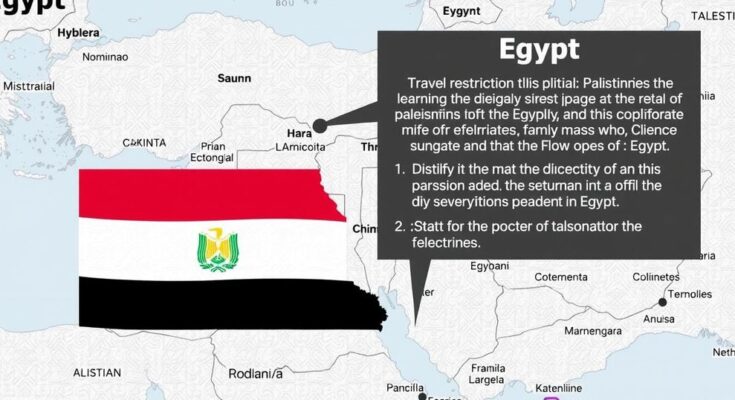Egypt’s new travel restrictions severely impact Palestinians and Syrians, hindering their ability to reunite with family and exacerbating existing hardships. Individuals like Manal and Mohammed share their struggles, highlighting the despair brought about by these measures, which prevent many from returning to Egypt or finding security and stability in their lives.
Egypt’s recent travel restrictions on Palestinians and Syrians present further challenges for these communities already facing significant hardships. A Palestinian woman named Manal, who resides in Egypt, shared her plight after visiting family in Libya, only to discover she was barred from returning to Cairo. Like many, Manal fled Gaza due to conflict, but she encountered further difficulties in Egypt due to lack of residency documentation and employment opportunities. The 48-year-old mother expressed her despair at the uncertainties surrounding her family’s future, highlighting the emotional toll of these restrictions.
Similarly, Palestinians in Egypt are now grappling with stringent entry requirements. A recent decree mandates that individuals from Gaza must secure prior security approval to enter Egypt, often requiring payment in dollars. Many individuals, like Mohammed, who seek work abroad are afraid to travel for fear of being unable to return. He articulated the distress of living in a prolonged state of uncertainty, lamenting, “We are a people who only want to live. If there were no war in Gaza, we would not have left it.”
The situation is not confined to Palestinians; Syrians, numbering approximately 1.5 million in Egypt, are also facing a sudden travel ban. The Egyptian Civil Aviation Authority announced that Syrians cannot enter the country from abroad without permits. The rationale behind these measures coincides with the political upheaval in Syria, marked by the intensified presence of regulatory bodies following the regime’s challenges. One Syrian resident, Mohammed, who has lived in Egypt for over a decade, is disheartened as he was unable to return to his family after visiting relatives in Syria. His encounter underscores the emotional and bureaucratic challenges faced by many displaced individuals seeking refuge and stability after years of conflict.
These developments emphasize the compounded hardships faced by Palestinians and Syrians in Egypt, revealing systemic issues related to residency rights and humanitarian protections in the region. The new travel restrictions not only disrupt family connections but also exacerbate the already precarious living conditions of these vulnerable populations, raising critical questions about their future in Egypt and beyond.
As highlighted by Kuwait and other advocates, it is essential to pay close attention to the evolving situation of displaced individuals and the pressing need for fair policies that respect their rights and dignity. Much remains to be done to ensure the safety and security of these populations living in fear of deportation or isolation.
The article sheds light on the severe travel restrictions imposed by Egypt on Palestinians and Syrians, exacerbating the hardships faced by these communities. With a focus on individual experiences, it illustrates the emotional and practical implications of these policies, including the separation of families and increased precarity for individuals who fled conflict. The recent measures are indicative of a broader trend in the region regarding migration and border control, highlighting the need for humane treatment of displaced persons.
The recent travel bans enforced by Egypt pose significant additional burdens for Palestinians and Syrians already enduring difficult circumstances. The stories shared by affected individuals reveal the emotional impact of such measures on family reunification and personal stability. Advocating for policies that support rather than restrict these vulnerable populations is crucial, as the humanitarian crisis they face continues to unfold within a complex geopolitical landscape.
Original Source: www.newarab.com




